 Petzlover
Petzlover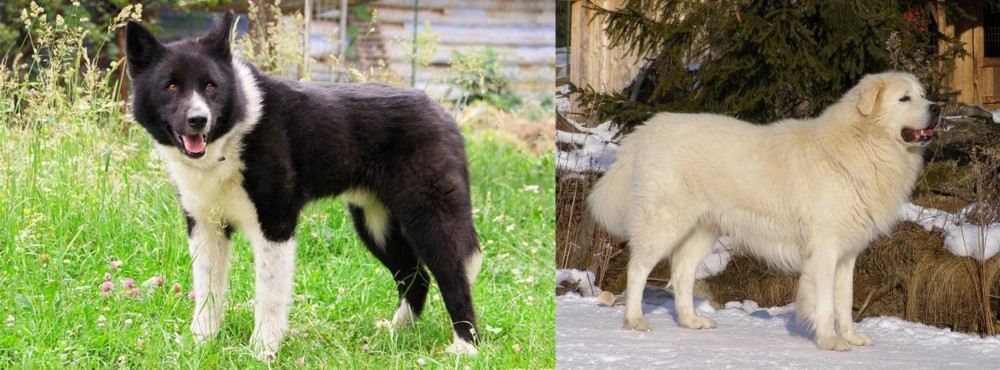 Karelian Bear Dog is originated from Finland but Slovak Cuvac is originated from Slovakia. Karelian Bear Dog may grow 10 cm / 3 inches shorter than Slovak Cuvac. Karelian Bear Dog may weigh 21 kg / 46 pounds lesser than Slovak Cuvac. Both Karelian Bear Dog and Slovak Cuvac has almost same life span. Both Karelian Bear Dog and Slovak Cuvac has same litter size. Both Karelian Bear Dog and Slovak Cuvac requires Moderate Maintenance.
Karelian Bear Dog is originated from Finland but Slovak Cuvac is originated from Slovakia. Karelian Bear Dog may grow 10 cm / 3 inches shorter than Slovak Cuvac. Karelian Bear Dog may weigh 21 kg / 46 pounds lesser than Slovak Cuvac. Both Karelian Bear Dog and Slovak Cuvac has almost same life span. Both Karelian Bear Dog and Slovak Cuvac has same litter size. Both Karelian Bear Dog and Slovak Cuvac requires Moderate Maintenance.
 The Karelian Bear Dog is a Finnish Spitz-type dog who is regarded as a national treasure in the country. They have always been noted for their hunting skills, and because the dog has been found in ancient Viking graves you can assume it is an ancient breed.
The Karelian Bear Dog is a Finnish Spitz-type dog who is regarded as a national treasure in the country. They have always been noted for their hunting skills, and because the dog has been found in ancient Viking graves you can assume it is an ancient breed.
In fact the ancestry of the dog can be traced to neolithic times, when dogs followed human settlers to regions of Scandinavia and Europe.The American Kennel Club does not fully recognize the Karelian Bear Dog. It is however included in their Foundation Stock Service.
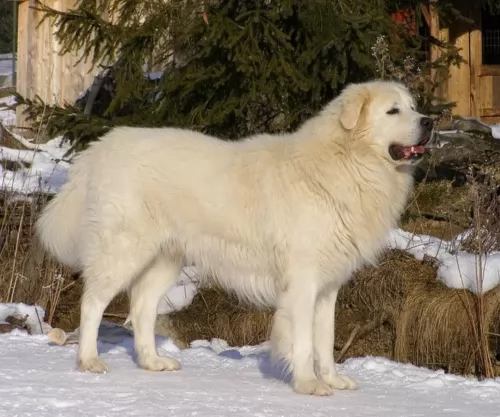 Looking quite a bit like the Pyrenean Mountain Dog, the Slovak Cuvac is a large dog that has served as a guard dog. The Slovensky Cuvac is still used on sheep farms as he isn’t afraid of wolves and bears and will take them on if needs be.
Looking quite a bit like the Pyrenean Mountain Dog, the Slovak Cuvac is a large dog that has served as a guard dog. The Slovensky Cuvac is still used on sheep farms as he isn’t afraid of wolves and bears and will take them on if needs be.
Records of this dog have been kept since the 17th century already, and when the breed started dying out, a certain Dr Antonin Hruza put in efforts to revive the dog.
The registered breeding of the Slovensky Cuvac was established in Czechoslovakia and a club for the dog was established in 1933. A written standard was established in 1964. The dog is not recognized by the Fédération Cynologique Internationale.
 Standing at between 54–60cm in height and weighing roughly 20–23 kg, the medium sized Karelian Bear Dog has a beautiful shiny coat. The outercoat is shortish, straight and dense and the undercoat is soft and thick.
Standing at between 54–60cm in height and weighing roughly 20–23 kg, the medium sized Karelian Bear Dog has a beautiful shiny coat. The outercoat is shortish, straight and dense and the undercoat is soft and thick.
The color of the coat is black with white markings. The dog has a bushy tail which curls in a circle over the back and the tail’s end is white. The ears of the dog are small and erect while the small eyes are intense.
It is best to have your Karelian Bear dog trained and socialized as he can tend to be aggressive towards other pets in the house, and even towards people he isn't familiar with. The owner of these dogs must be firm and fair with training as the Karelian is a strong-willed dog.
He is devoted to his human owners while being somewhat aloof and unfriendly with strangers. They are very territorial.
He is a very social dog and just loves spending time outdoors with his family. He is also good with children in the home as he is a playful dog.He is a dog who is going to require a lot of space to use up his energy. He needs a lot of mental and physical stimulation, as in the past he has always had a lot of work to do, and just loves being active. He is a confident, brave dog who takes his job as family protector seriously.
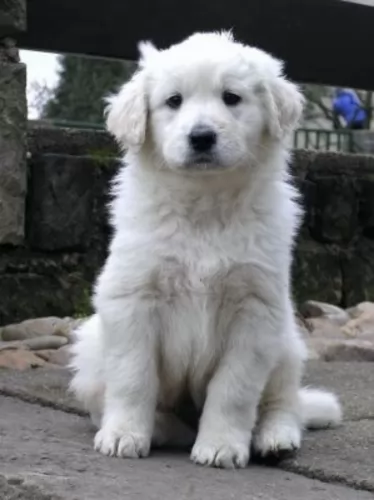 This is a large dog standing at between 59 and 70cm in height and weighing between 31 and 44kg.
This is a large dog standing at between 59 and 70cm in height and weighing between 31 and 44kg.
The neck is broad and has quite a bit of fur around it. The head is large, the eyes dark brown, the double coat is white and thick and medium length. The eyes are brown, the ears medium length and floppy and the tail long and furry.
This is a robust dog, used to spending time outdoors keeping watch over livestock. When he is invited into the home, he is gentle and well behaved, more so when he has been trained and socialized.
He is loving and loyal towards his human family and will get on well with children in the home. He isn’t the brightest dog but you can still have him trained.
 Your energetic Karelian Bear Dog isn’t recommendeded for life in the city in a small garden. He needs a large garden or farm where he can run far and wide.
Your energetic Karelian Bear Dog isn’t recommendeded for life in the city in a small garden. He needs a large garden or farm where he can run far and wide.
Exercising him will be an important part if you own one of these dogs. He is a social, friendly, active family pet who happens to make a good watchdog too.
Make sure you have your Karelian Bear Dog trained and socialized and he’ll make you a wonderful friend and pet.
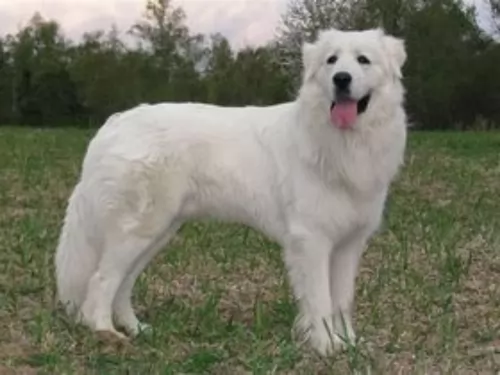 Your playful Slovak Cuvac is an affectionate dog, wanting nothing more than to be totally involved in his family’s life.
Your playful Slovak Cuvac is an affectionate dog, wanting nothing more than to be totally involved in his family’s life.
He is social and loving and also makes an excellent watchdog. He’s a big dog so think carefully before you bring him into your home. Many dog owners like the look of a big dog and forget that it costs a lot of money to feed a big dog and to pay for vet fees.
This big dog is wanting to be part of your family and not just to be discarded when you find that he is costing you too much.
 The Karelian Bear Dog can reach 10 to 12 years of age with good care, but just like with other dog breeds, he can be prone to certain health problems such as eye and dental problems as well as hip dysplasia.
The Karelian Bear Dog can reach 10 to 12 years of age with good care, but just like with other dog breeds, he can be prone to certain health problems such as eye and dental problems as well as hip dysplasia.
Many people don’t realize that dental problems are far more serious than what they imagine. An offensive breath can be the first warning sign of tooth decay with your canine friend.
There are other problems that can develop orally for your dog and these include inflammation of the gums, swollen gums and mouth tumors. You need to brush your pet’s teeth but also see to it that he goes for regular dental check-ups at the vet.
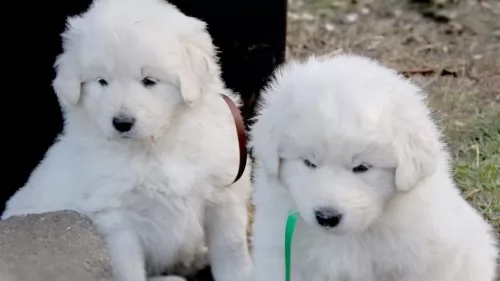 This is a healthy dog breed, but as with many large dogs, hip dysplasia is a threat. Hip dysplasia is always reason for concern as the condition can reduce a dog’s quality of life.
This is a healthy dog breed, but as with many large dogs, hip dysplasia is a threat. Hip dysplasia is always reason for concern as the condition can reduce a dog’s quality of life.
It is distressing seeing your once active pet becoming reluctant to play and move around.
Canine hip dysplasia is a common skeletal condition. It can strike any size dog but is more prevalent with large dogs. The ball and socket of the hip doesn’t fit properly and deterioration sets in resulting in loss of function of the joint.
You will need to get your dog to the vet who will perform a physical exam and discuss treatments to alleviate the pain your dog can experience.
 There are many people who just keep a dog for watchdog purposes and fail to make the pet a proper family member by meeting its physical and emotional needs.
There are many people who just keep a dog for watchdog purposes and fail to make the pet a proper family member by meeting its physical and emotional needs.
Caring for a dog means providing nutritious food and clean drinking water, seeing that he has a warm, dry place to sleep, providing the dog with exercise and ensuring the dog is healthy and content.
Caring for a dog is a big responsibility, and you have to think carefully before you bring a dog into your home and life.
You need to be careful with the food you select for your pet. If you’re feeding him a commercially manufactured food, you need to make sure to read the label and make sure the top ingredients are meat and not meat by-products. If this is something you’ve never thought about, ask your veterinarian for food recommendations.
Speaking of veterinarians, make sure you have a reliable, reputable vet you can call on. At some time or other your pet may get sick and then you want to have the name of a reliable vet in your contacts list on your cell phone. Sometimes your pet can become suddenly sick where he will need immediate, emergency help from the vet.
Just like you look after yourself, you need to look after your pet by brushing him, checking him for fleas, ticks and worms and keeping an eye on his eyes, ears, teeth and general health.
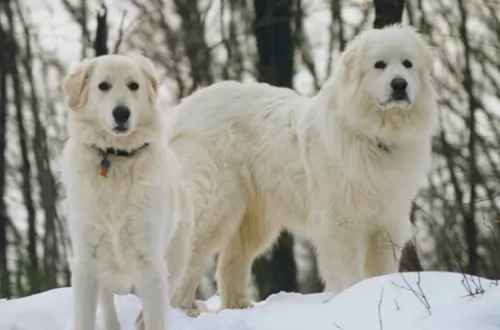 ◆The thick white hair will require regular grooming to keep it free from burrs and dirt. He sheds so this brushing will help him to look more groomed.
◆The thick white hair will require regular grooming to keep it free from burrs and dirt. He sheds so this brushing will help him to look more groomed.
◆The nails should be trimmed regularly and the ears too should be checked for redness and infection. You’ll need to look inside his mouth too as a rotting tooth can cause havoc within his body. A rotten tooth can also cause him tremendous pain and he has no way of telling you this.
◆Have your pet spayed or neutered if you don’t want any puppies. This is better for your dog’s health in the long run too.
◆Your Slovak Cuvac is going to need a lot of exercise as they have always been used to roaming the mountains watching over livestock.
◆This is a big dog so if you buy commercially manufactured food, make sure its for large, energetic dogs. There are good commercially manufactured dog foods on the market – just make sure you buy the best one for your pet to enhance health and longevity.
Try and give him some home made food too. Healthy food which won’t jeopardise his digestion is boiled chicken, brown rice or pasta and spinach, sweet potatoes and carrots. These can all be chopped up and small portions mixed into the dry kibble twice a week as a treat.
Try and include some raw meat occasionally. Your dog will thank you for not giving him exotic people foods which can do lots of harm. Ensure there is always a bowl of fresh, cool water within his reach.